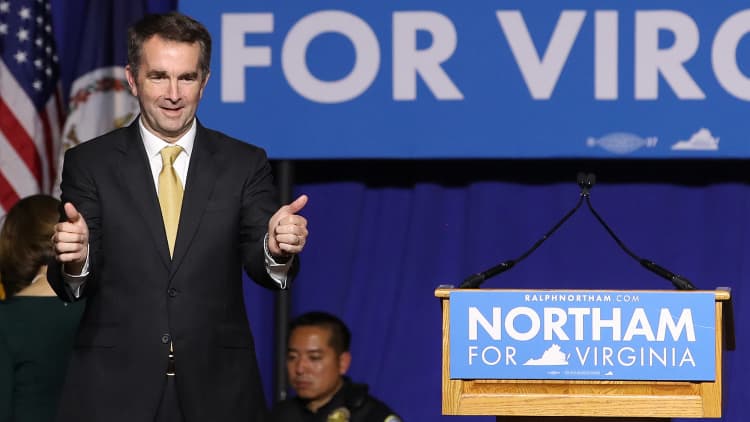
The sweeping election rebuke for President Donald Trump and his party has increased the chances of failure for the Republican agenda on Capitol Hill.
In political terms, Tuesday's off-year elections gave landmark victories to Democrats from Virginia to Washington state. They flipped the New Jersey governorship and Washington state senate from Republican to Democratic control, leaving both states under unified Democratic governance.
In Virginia, Ralph Northam's lopsided defeat of former Republican National Committee Chairman Ed Gillespie kept the governorship in Democratic hands. And as they rejected Gillespie's racially tinged, Trump-style tactics on crime, immigration and cultural change, Virginia voters also placed Democrats on the brink of retaking control of the House of Delegates in a stunning upset.
And those victories, fueled by opposition to Trump among young, minority and college-educated white voters, carry national policy implications.
The Virginia results increased the likelihood that the state will vote to expand Medicaid under Obamacare. Republicans had blocked outgoing Democratic Gov. Terry McAuliffe from achieving that goal.
At the same time, voters in Maine took Medicaid expansion into their own hands by approving it in a referendum that overpowered opposition from Republican Gov. Paul LePage. Entrenching the expansion in a 32nd state — where Sen. Susan Collins has already cast a key vote against Obamacare repeal — makes Trump's hope for reviving that effort even more remote.
That also heaps additional pressure onto a Capitol Hill tax debate that got underway in earnest this week, with precious little margin for error. Specifically, it made it more difficult for a specific subset of Republican lawmakers that Trump and party leaders need to hold behind a bill designed to pass without any Democratic support.
"If you're a suburban Republican member of the House, you're terrified," said Peter Wehner, a former White House aide to President George W. Bush. If they didn't already have enough anxiety about facing voters in 2018, the House GOP tax bill adds more because its elimination of the state and local income tax deductions will leave many upper-middle-class suburban Republicans with higher — not lower — tax bills.
The counterargument from Republican leaders will cast unity and success in passing tax cuts, after their dispiriting failure on Obamacare, as the only way the party can stave off a 2018 catastrophe. Strategists on both sides concede it may get traction, even as the NBC News/Wall Street Journal poll this week showed the tax effort beginning with support from only 25 percent of Americans.
"The correct interpretation for the tax bill is 'stay away, it may annihilate us,'" said Mark Mellman, a top Democratic pollster. But "some Republicans may wrongly conclude, 'We've got to pass something even if voters hate it.'"
Yet, Republican unity has grown more difficult to sustain all year amid the chaos of the Trump White House, the rising danger from special counsel Robert Mueller's Russia investigation and the erratic nature of the president's personal behavior. Republican Sens. Jeff Flake, Bob Corker and John McCain have grown increasingly voluble in blasting the president and questioning his agenda.
Tuesday's election verdict won't discourage other Republicans inclined to follow their lead. And Trump himself on Tuesday night demonstrated once again that he feels no personal loyalty to fellow Republicans.
Even as a large bloc of Virginians told exit pollsters they were voting to send a message against him, the president blamed the losing Republican gubernatorial candidate.
"Ed Gillespie worked hard," Trump said on Twitter while traveling in South Korea, "but did not embrace me or what I stand for."


